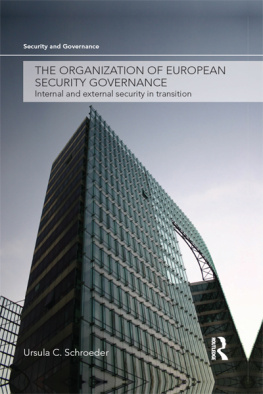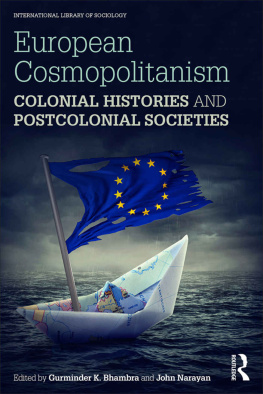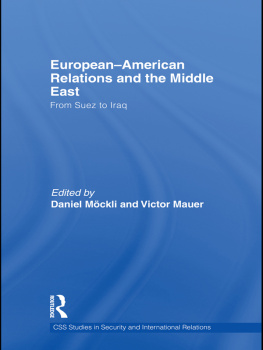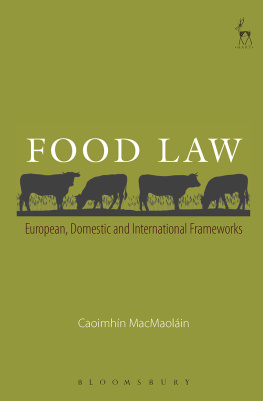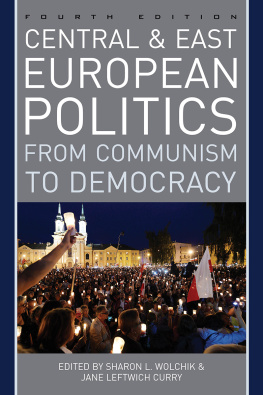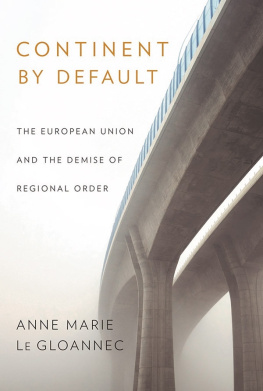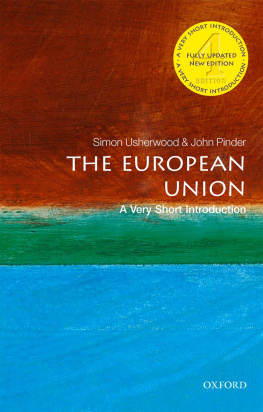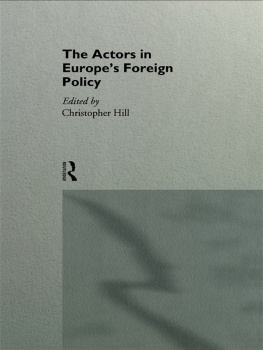Copyright 2017 by Guy Verhofstadt
Published in the United States by Basic Books, an imprint of Perseus Books, LLC, a subsidiary of Hachette Book Group, Inc.
All rights reserved. Printed in the United States of America. No part of this book may be reproduced in any manner whatsoever without written permission except in the case of brief quotations embodied in critical articles and reviews. For information, address Basic Books, 250 West 57th Street, 15th Floor, New York, NY 10107.
Books published by Basic Books are available at special discounts for bulk purchases in the United States by corporations, institutions, and other organizations. For more information, please contact the Special Markets Department at Perseus Books, 2300 Chestnut Street, Suite 200, Philadelphia, PA 19103, or call (800) 810-4145, ext. 5000, or e-mail special.markets@perseusbooks.com.
D ESIGNED BY L INDA M ARK
Library of Congress Cataloging-in-Publication Data
Names: Verhofstadt, Guy, 1953 author.
Title: Europes last chance : why the European states must form a more perfect union / Guy Verhofstadt.
Description: New York : Basic Books, 2016.
Identifiers: LCCN 2016037184 (print) | LCCN 2016044014 (ebook) | ISBN 9780465096855 (hardback) | ISBN 9780465096862 (ebook)
Subjects: LCSH: European cooperation. | European Union countriesPolitics
and government21st century. | BISAC: HISTORY / Europe / General. | BIOGRAPHY & AUTOBIOGRAPHY / Presidents & Heads of State. | HISTORY / United States / General.
Classification: LCC JN30 .V4656 2016 (print) | LCC JN30 (ebook) | DDC
341.242/2dc23
LC record available at https://lccn.loc.gov/2016037184
E3-20161216-JV-PC
To Heinrich von Brentano and Paul-Henri Spaak
E UROPE WEATHERED CRISES BEFORE, BUT TODAY THE E UROPEAN Union (EU) is stretched beyond measure: Great Britains decision to exit the EU; devastating terrorist attacks in Paris; desperate refugees flooding into nations unableor unwillingto shelter them humanely; intricate currency issues shaking the foundation of a common market; belligerents like Russia and the Islamic State in Iraq and Syria (ISIS) promising fearful assaults. Nevernot in all my years as Belgiums prime minister and later on as a leader within the European Parliamenthave I seen Europe standing so close to the brink.
Many see this crisis as proof that the European Union is broken beyond repair. Indeed, some may deem Great Britains vote foolish, but it was a response to very real threats. And yet, clearly no one country can address all of these threats alone. In the weeks immediately following the Brexit vote, we were already witnessing Great Britains struggle with its independence.
Without a powerful new vision for the continent as a whole working together, Europe will very soon be lost to itselfand to its principal ally, the United States, whose need for support in a multipolar world has never been greater. For we Europeans, and for our American friends, this really is our last chance.

A U NITED S TATES structured on the European model would be laughable. Imagine a US federation in which each state governor had veto power to block any decision from Congress or the president, an America where the governor of the smallest state could torpedo nationwide immigration reform or federal fiscal reform. Imagine a United States conceived as an asymmetric federation in which states could opt out of the Federal Bureau of Investigation (FBI), the Border Patrol, the Coast Guard, or the dollar, in which the states could say, We claim our right to join any of these federal institutions later, but for the moment we will simply observe and see how the rest of you cope. The world might believe the Americans had gone rogue, that it was impossible to safeguard a continent and build a world economy on the shaky foundations of voluntary participation.
Nevertheless, Europe finds itself in exactly that position today. There is no cooperation between the twenty-eight member states of the European Unionsoon to be twenty-seven once the Brexit is set in motion. We have twenty-eight national intelligence services, which, each on their own, combat organized crime and terrorism. Yet the tragic 2015 events in Paris made it heartbreakingly clear that this fragmented strategy has failed. Following attack after attack, we learned that at least one of our national intelligence services had known of the terrorists but had been unable to pursue them across intra-European borders. Information exchange between our twenty-eight national intelligence services only happens erratically, on a voluntary basis, seriously weakening each countrys security.
The security services mandated to protect European citizens still respect old borders; terrorists and criminals assuredly do not.
It is time to speak the unthinkable. The 2015 Paris attacks culminated a decade of preventable terrorism in Europe. After the attacks in 2004 in Madrid, in 2005 in London, and in 2014 in Brussels, European leaders finally came up with the idea of a unified European record of passenger names to determine who flies in and out of the union. But this system is European in name only, because, in the name of sovereignty, it consists of twenty-eight unconnected national databases. But what is sovereignty when you cannot keep your citizens safe? Although we have free movement of people within Europe, we still dont have a common system to secure our European space. The Europe we have instead is less than the sum of its parts.
And this state of affairs stems not just from terrorism. Twenty-eight member states hold veto power over almost every decision, from whether to rescue Greeces plummeting economy to how to deal with the mass influx of refugees from Syria, Afghanistan, and Iraq. Despite the continental importance of such decisions, it takes only one small partylike the extreme right True Finns, a junior partner in Finlands coalition government, representing only half a million votersto threaten the Greek deal and thus the future of the entire eurozone. It takes only a handful of prime ministersfrom countries the size of New Hampshireto block an agreement on the refugee crisis, stymying a desperately needed solution for the thousands of people arriving on European soil every day, looking for shelter and protection.
The Brexit vote provides only one example of how European nations fold back on themselves and increasingly look inward instead of to the outside world. While the world catches fire and our economy remains bogged down, we fan the flames by plunging ourselves into an institutional crisis. Member states hubris is the delusion that they can only regain sovereignty by splitting off from the European project and facing the great challenges on their own.
It is no exaggeration that, at this point, old nationalisms pose more danger to Europe than new threats. We might meet and overcome each of these fresh challengesif only we could learn to pull together.
T HOSE WHO DOUBT that a continental democracy is possibleor, indeed, desirableneed only look to the United States. Unless Europe learns to emulate its American cousin, it is surely doomed.
Many Americans think Washington, DC, is broken. These citizens believe federal politics can no longer deliver because of polarization and gridlock. Well, the situation in the American capital is nothing compared with the European quagmire. Many Americans criticize their governments response to the financial crisis, whereas from our perspective in Europewhere the crisis has never endedAmericas actions were shockingly successful. Eight years later, Europe is the only continent on the globe that has still not recovered from the economic meltdown. We grow at a pace to slow to create new jobs. We are economically weak. We have a common currency supported by a microscopic treasury that covers barely 1 percent of European gross domestic product. These concerns only exacerbate the existential catastrophe: ultimately, there is a real chance that the EU could break up.


